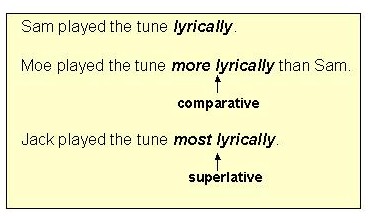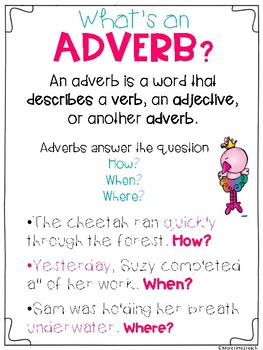ADVERBS
ADVERBS
Adverbs are traditionally defined as words that describe verbs.
Adverbs answer any of the following questions about verbs:
|
how? when? where? why?
|
The following examples illustrate adverbs modifying verbs:
|
How did he lift the barbell?
|
Easily is an adverb.
|
When will we use it?
|
Tomorrow functions as an adverb.
|
Where did she hide the key?
|
Nearby is an adverb.
|
Adverbs are the most moveable of all parts of speech; therefore, it is sometimes difficult to identify an adverb on the basis of its position in a sentence.
|
For example, the adverb slowly will fit into three places in the sentence He climbed the ladder:
|

Most adverbs end in -ly. In fact, most adverbs are formed by adding -ly to adjectives:
|
 |
Like adjectives of more than one syllable, adverbs usually become comparative and superlativeby using more and most.
|
Examples:
|

Flat adverbs
Adjectives that do not change form (add -ly) to become adverbs are called "flat adverbs."
Typical flat adverbs are early, late, hard, fast, long, high, low, deep, near.
To determine whether these words are functioning as adjectives or adverbs, one must determine
|
1) what the word is describing (noun or verb)
|
2) what question the word is answering
|
The following examples illustrate the distinction.
|
Early as adjective:
|
Early describes the noun train and answers the question "which one?"
|
Early as adverb:
|
Early describes the verb arrived and answers the question "when?"
|
Hard as adjective:
|
 |
Hard describes the noun pass and answers the question "what kind?"
|
Hard as adverb:
|
Hard describes the verb threw and answers the question "how?"
|

examples
- Briskly: Kristen briskly walked to the library, eager to complete her homework.
- Brutally: It was brutally clear he was not interested in hearing my opinion.
- Cheerfully: April cheerfully greeted Mark each morning.
- Expertly: Adam expertly maneuvered the components of the machine into their proper positions.
- Randomly: I love to randomly share interesting trivia with my friends and family.
- Sloppily: He writes sloppily, but insists his ideas are more important than having perfect penmanship.
- Uneasily: Jemma sighed uneasily, knowing that the dark sky was a sign of the impending storm.
- Weirdly: She dances weirdly, but her quirky personality is what I love the most.
- Wholeheartedly: I wholeheartedly believe education is the key to a better future.
- Wickedly: "I don't think you want to know the whole story," he said wickedly.
Adverbs Tell Where It Happened
Some adverbs describe the location of an action. Examples of adverbs like this would include:
- Downstairs: The public library often holds meetings downstairs.
- Everywhere: Jack looked everywhere for his missing keys.
- Here: She will plant her garden here.
- In: We stayed in to watch a movie instead of attending the party.
- Inside: When it's hot and humid, Anna likes to read inside.
- Outside: The children love to play outside.
- Somewhere: I want to go fishing somewhere warm and sunny.
- There: We went to Minnesota for my cousin's wedding and stayed there for three nights.
- Underground: The gopher began burrowing underground.
- Upstairs: I went upstairs to see my grandma who was on bed rest.
Adverbs Tell When It Happened
Examples of adverbs that describe when an action occurred include:
- Early: She arrived early for the meeting.
- First: When I bake, I make cookies first.
- Last: When I clean, I do laundry last.
- Later: I will stop by later to see how you are doing.
- Never: He never wants to go to the park with me.
- Now: The movie is starting now.
- Regularly: Writing regularly in my journal is soothing.
- Today: I have many things to accomplish today.
- Tomorrow: Tomorrow, we are going to the movies.
- Yesterday: She came over for a visit yesterday.
Adverbs Tell the Extent of the Action
Adverbs also describe the extent to which something was done, including:
- Almost: I almost stopped at McDonald's for lunch, but I was running late.
- Also: A talented singer, Jamie also enjoys playing the saxophone.
- Enough: Daniel is finally tall enough to ride the roller coaster.
- Only: I only take the bus to work on Mondays.
- Not: He is not running that race today.
- Quite: I was quite pleased to see my son's progress in school this year.
- Rather: I am rather tired after spending the day at the beach.
- So: I am so hungry, I could eat a horse.
- Too: It is too loud in here for me to concentrate.
- Very: Baby Emily was very tired after missing her afternoon nap.
exercises
- Joanne is happy. She smiles .
- The boy is loud. He shouts .
- Her English is fluent. She speaks English .
- Our mum was angry. She spoke to us .
- My neighbour is a careless driver. He drives .
- The painter is awful. He paints .
- Jim is a wonderful piano player. He plays the piano .
- This girl is very quiet. She often sneaks out of the house .
- She is a good dancer. She dances really .
- This exercise is simple. You have to put one word in each space.

Comentarios
Publicar un comentario